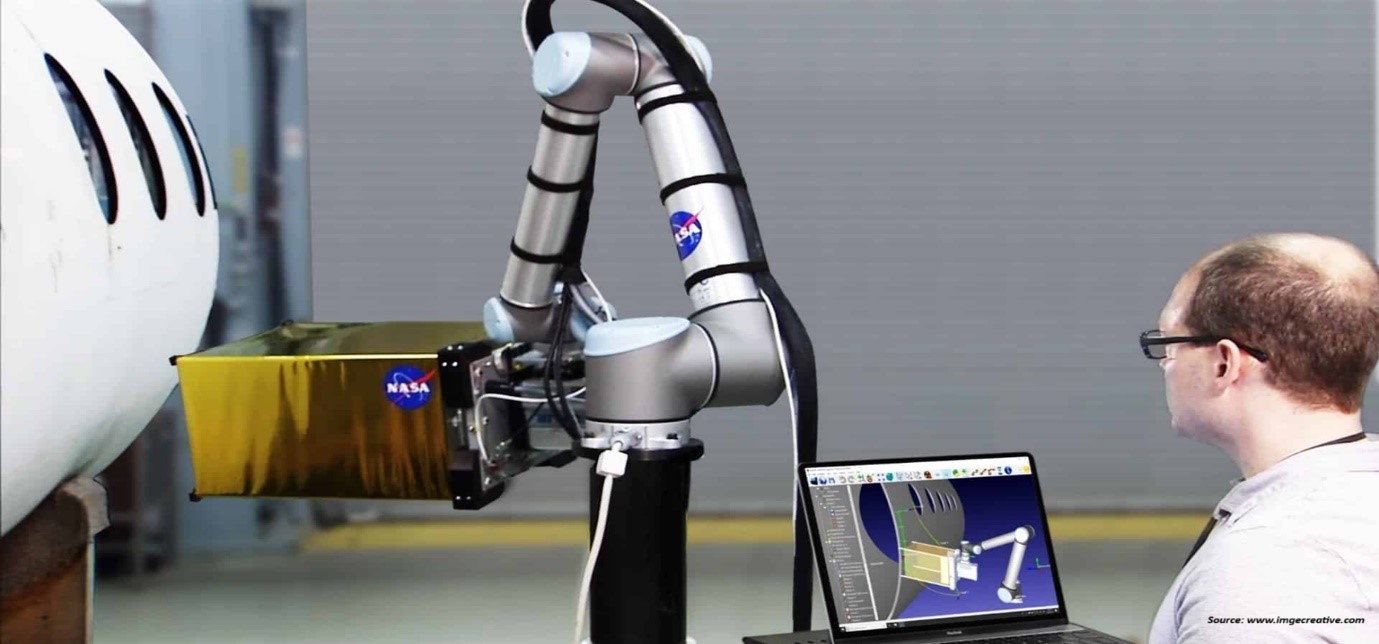
North America Coworking Space Market by Business Type (Conventional Co-working, Professional Co-working, and Others), by Business Model (Sub-Lease Model, Revenue Sharing Model, and Owner-Operator Model), by and End User (Independent Professionals, Startup Teams, Small and Medium Sized Enterprises, Large Scale Enterprises and Commercial)– Global Opportunity Analysis and Industry Forecast, 2024–2030
Industry: ICT & Media | Publish Date: 02-Jan-2025 | No of Pages: 96 | No. of Tables: 64 | No. of Figures: 39 | Format: PDF | Report Code : IC2043
US Tariff Impact on North America Coworking Space Market
Trump Tariffs Are Reshaping Global Business
Market Overview:
The North America Coworking Space Market size was valued at USD 5.34 billion in 2023, and is expected to reach USD 10.97 billion by 2030, with a CAGR of 10.3% from 2024 to 2030. A coworking space serves as a shared office setting where individuals from diverse backgrounds or companies work independently alongside each other. These spaces offer essential amenities like desks, chairs, high-speed internet, and meeting rooms, supplemented with additional services such as printing and networking events. Freelancers, remote workers, startups, small businesses, and even larger corporations often utilize coworking spaces as temporary or satellite office solutions. These spaces cater to those seeking a productive work environment beyond their homes or conventional offices, while also fostering opportunities for social interaction and professional development.
Growing Startups Fueling the Expansion of Coworking Spaces in North America
The growing number of startups in North America significantly contributes to the expansion of coworking spaces across the region. North America, particularly the U.S. and Canada, is renowned as a hub of innovation and entrepreneurship within the global startup ecosystem. The U.S. alone boasts an impressive 252 cities in the startup ecosystems among the top 1,000 globally, highlighting its dominance in the field.
This proliferation of startups in North America is fueled by various factors, including access to abundant resources, supportive regulatory frameworks, and a culture that encourages risk-taking and innovation. For instance, the U.S. offers numerous grants, incentives, and funding opportunities for startups at both the federal and state levels, as well as through corporate-sponsored competitions.
In 2023, U.S. investors injected a staggering USD 170.6 billion into startups, underscoring the robust investment landscape that further fuels the growth of new ventures. As startups continue to emerge and flourish across North America, the demand for flexible and cost-effective workspace solutions provided by coworking spaces has surged. These spaces offer startups a conducive environment for collaboration, networking, and productivity, making them an integral part of the dynamic entrepreneurial ecosystem in the region.
Blockchain Technology Revolutionizing Coworking Spaces in North America
As the demand for coworking spaces continues its upward trajectory, the imperative for efficient management and transparent operations becomes increasingly evident. In response to these evolving needs, blockchain technology emerges as a transformative force, offering a plethora of advantages that redefine the coworking landscape. A notable example of blockchain's integration into the coworking sector is evident in industry giant WeWork's acceptance of select cryptocurrencies as payment for its services. Through strategic partnerships with BitPay and Coinbase, WeWork has expanded its payment options to include Bitcoin, Ethereum, USD Coin, Paxos, and other cryptocurrencies, signaling a significant shift towards blockchain adoption within the flexible workspace industry.
Blockchain technology, renowned for its intrinsic features of transparency, security, and decentralization, presents a compelling solution to many of the challenges inherent in coworking spaces. From streamlining space bookings and scheduling processes to ensuring transparent billing and payment systems, blockchain offers a robust framework for enhancing operational efficiency and trust within coworking ecosystems. Moreover, the application of blockchain extends beyond operational optimizations to encompass broader coworking-operator processes such as procurement and membership agreements. By leveraging blockchain-based tools, coworking operators can establish more secure, efficient, and cost-effective systems that enhance digital visibility and facilitate smoother interactions among stakeholders.
Hybrid Working Models in Several Companies Propelling the Market Demand
As hybrid work arrangements gain momentum, the dynamics of work in North America are undergoing a profound shift, propelling the expansion of the coworking spaces market. With employees increasingly adopting hybrid approaches that blend remote and in-office work, the demand for flexible and collaborative workspace solutions provided by coworking spaces is soaring. Employers are responding to this trend by embracing a people-centric approach to work design, prioritizing flexibility, intentional collaboration, and empathetic management practices. This approach resonates with the needs of hybrid workers navigating a flexible work environment, leading to the increased adoption of coworking spaces as viable alternatives to traditional office setups.
A study conducted by Gartner in 2023 highlights the prevalence of the hybrid work trend, particularly in the United States, where it is more pronounced compared to the rest of the world. In fact, 51% of knowledge workers in the U.S. have embraced hybrid work arrangements, while an additional 20% have opted for fully remote work setups. This significant adoption of hybrid and remote work translates into a combined 71% of the U.S. workforce engaging in fully remote or hybrid work by 2023. By offering dynamic solutions that align with the evolving needs of hybrid workers, coworking spaces play a pivotal role in shaping the future of work in the region.
Lack of Exclusivity poses significant challenge for the coworking spaces industry
A significant factor restraining the growth of the coworking spaces market in North America is the lack of exclusivity inherent in many coworking environments. Unlike private offices, where businesses can secure dedicated spaces tailored to their specific needs, coworking spaces often offer memberships with unlimited access to communal workspaces for various types of companies.
This lack of exclusivity can result in overcrowded spaces and limited access to amenities such as meeting rooms. Moreover, the open nature of coworking spaces means that individuals and businesses cannot guarantee that they will be working alongside like-minded professionals or within a community that aligns with their goals and values.
Incorporation of Coworking-as-a-Service (CaaS) to Create Opportunities in the Future
A notable trend shaping the future of coworking spaces is the transition from mere physical spaces to comprehensive service offerings, known as Coworking-as-a-Service (CaaS). This evolution recognizes that users now expect more than just a workspace; they seek a suite of additional benefits tailored to their needs. CaaS goes beyond providing flexible workspace and desks; it encompasses a range of perks such as 24-hour keycard access, mentorship programs, and access to venture capital. This holistic approach aims to enhance the user experience and meet the diverse needs of coworking space occupants.
Moreover, CaaS leverages digital technology to streamline operations, offering niche spaces tailored to specific communities, fostering mentorship opportunities, and reducing administrative burdens for users. Additionally, there is a growing emphasis on sustainability within CaaS offerings, aligning with the values of environmentally conscious users.
The U.S Dominates the North America Coworking Space Market, with the Highest CAGR till 2030
The surge in demand for flexible working arrangements, including coworking spaces, is a key driver of market growth in the U.S. According to Gitnuz Organization, a leading commerce media company, the number of coworking spaces in the US skyrocketed from just 22 in 2007 to an impressive 4,528 in 2018. American workers now account for 45% of the global coworking industry, highlighting the significant presence of coworking spaces in the US market.
Moreover, the rapid expansion of the coworking space market is evidenced by the staggering growth in the number of coworking spaces available in the US. In 2017, there were approximately 4,000 coworking spaces in the country. By 2022, this number had surged to over 6,200, reflecting a remarkable 55% growth in just five years.
The increasing popularity of coworking spaces is further fueled by the rising number of startups and freelancers in the US. As the birthplace of some of the world's most successful startups, including SpaceX, Instagram, and Airbnb, the U.S. continues to foster a vibrant entrepreneurial ecosystem. Additionally, a study conducted by the US Bureau of Labor Statistics predicts that 50% of the American workforce will be freelancing by 2027, further driving the demand for flexible workspace solutions.
This growth in startups and freelancers has led to the emergence of major coworking chains such as WeWork, Impact Hub, Alley, and District Cowork. These companies create shared spaces in multiple locations across major cities, catering to the diverse needs of entrepreneurs, freelancers, and small businesses.
Competitive Landscape
Several market players operating in the North America coworking space market include International Workplace Group (IWG), WeWork Inc., Vast Coworking Group, Industrious LLC, Premier Workspaces, Convene, Workstyle Flexible Spaces, Expansive, Newmark Group, Inc., Serendipity Labs and others. These market players are adopting strategies, such as product launches, to maintain their dominance in the North American market.
For instance, February 2024, Convene collaborated with LM Media Worldwide, a company that helps to find hotels for various occasions, aims to enhance Convene’s commitment to being a one-stop-shop for meeting and event planners. Also, in January 2024, WeWork India collaborated with Yardi to launch a space management solution called WeWork Workplace. This software is designed to help large organizations and businesses optimize their office space requirements, providing real-time data analytics to identify and address operational inefficiencies.
Moreover, in January 2024, International Workplace Group (IWG) inaugurated 19 new co-working spaces across Egypt, Oman, and the UAE. The expansion is part of IWG (INTERNATIONAL WORKPLACE GROUP)'s strategy to open 1,000 new co-working spaces globally by the end of 2024, in response to the growing demand for hybrid working solutions from companies of all sizes.
KEY MARKET SEGMENTS
By Product Type
-
Conventional Co-working
-
Professional Co-working
-
Others
By Business Model
-
Sub-Lease model
-
Revenue Sharing Model
-
Owner-Operator Model
By Application
-
Independent Professionals
-
Startup Teams
-
Small and Medium Sized Enterprises
-
Large Scale Enterprises Commercial
By Country
-
The U.S.
-
Canada
-
Mexico
REPORT SCOPE AND SEGMENTATION:
|
Parameters |
Details |
|
Market Size in 2023 |
USD 5.34 Billion |
|
Revenue Forecast in 2030 |
USD 10.97 Billion |
|
Growth Rate |
CAGR of 10.3% from 2024 to 2030 |
|
Analysis Period |
2023–2030 |
|
Base Year Considered |
2023 |
|
Forecast Period |
2024–2030 |
|
Market Size Estimation |
Billion (USD) |
|
Growth Factors |
|
|
Countries Covered |
3 |
|
Companies Profiled |
10 |
|
Market Share |
Available for 10 companies |
|
Customization Scope |
Free customization (equivalent up to 80 working hours of analysts) after purchase. Addition or alteration to country, regional, and segment scope. |
|
Pricing and Purchase Options |
Avail customized purchase options to meet your exact research needs. |
KEY PLAYERS:
-
International Workplace Group (IWG)
-
WeWork Inc.
-
Vast Coworking Group
-
Industrious LLC
-
Premier Workspaces
-
Convene
-
Workstyle Flexible Spaces
-
Expansive
-
Newmark Group, Inc.
-
Serendipity Labs

















 Speak to Our Analyst
Speak to Our Analyst





















